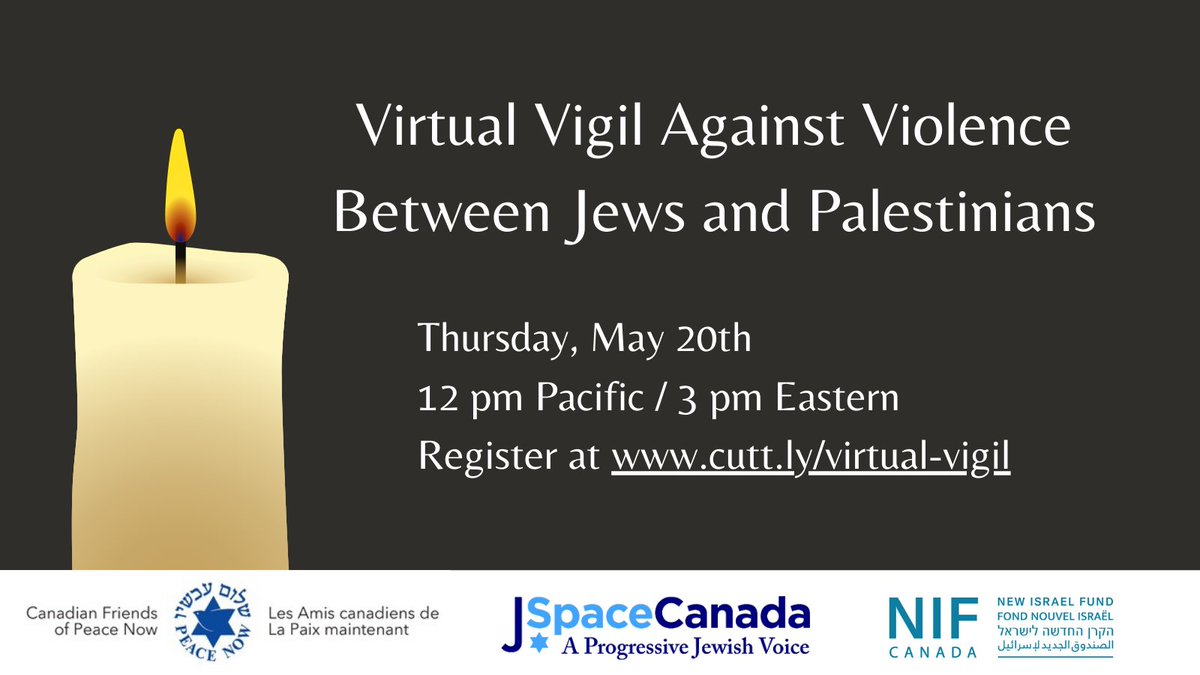Hours before Israel announced a ceasefire following 11 days of fighting with Hamas, some 500 progressive Jews in Canada gathered online for a virtual vigil “against violence between Jews and Palestinians.”
“Instead of despairing, we choose this moment to stand in solidarity with those on the ground who are working to repair Jewish-Arab shared society and bring about an end to the occupation,” said the program’s organizers, JSpaceCanada, Canadian Friends of Peace Now, and the New Israel Fund of Canada.
The recent violence between Israel and Hamas was “the culmination of years of neglect and inaction towards peace.”
The hour-long program heard from Dana Mills, director of development and external relations at Peace Now’s Israel office.
Working for peace while rushing in and out of bomb shelters is an “irony not lost on us,” she said.
What’s the message to Diaspora Jews who might feel reluctant to criticize Israel in time of war? They shouldn’t be pro-Israel or pro-Palestinian but pro-peace and against violations of human rights, Mills advised.
“Criticizing actions that are illegal and damaging is something that aids Israel and Palestine,” she said. “Please continue to advocate for peace and justice and with that, you will help everyone.”
Michal Sella, head of Givat Haviva, an Israel-based education centre that promotes reconciliation between Arabs and Jews, said the need to foster mutual understanding is greater than ever.
But she had harsh words for the Israeli leadership, saying the recent fighting with Hamas was “pretty much orchestrated from the top. We are all part of this political game where our leaders are just using us.
“I can’t image a normal democratic country where a mini civil war starts in the streets, and the prime minister doesn’t say anything for 24 hours,” Sella said.
Ben Murane, executive director of New Israel Fund of Canada, told the program that the latest round of fighting provided Jews and Palestinians with a “powerful call to action” and the realization “that if something is not done from within Israeli society, it will tear itself apart.”
He said there’s a growing movement in Israel that believes the answer to Jewish and Palestinian extremism and violence is partnerships, including within government.
The “groundswell” movement has seen 27 demonstrations of Jews and Palestinians against violence that sprang up on roadsides and town squares across the country, as well as interfaith parades and delegations of Jews and Arabs visiting victims of violence in hospitals.
“Israeli civil society has within it what is necessary to fix what has been broken.”
He said the NIF in Israel has launched a one-million shekel fund to fuel initiatives aimed at easing tensions “and begin picking up the pieces of this mess.”
Gabriella Goliger, national chair of Canadian Friends of Peace Now, advised to “become as informed as informed as possible and draw on multiple sources. Question the propaganda and be careful what you share on social media.”
She encouraged reaching out to those “beyond your own camp,” including Palestinians, Arabs and Muslims, and to fellow Jews “who do not think as you do. Acknowledge your differences but acknowledge too their distress and understand where they are coming from, and why.”
Michael Morgenthau, chair of JSpace’s policy committee, said “we cannot forget the occupation, the blockade, the evictions, racism. This is not the Israel we were promised by our teachers when we were young.”
He also referenced the “hatred on display around the world in recent days… so much explicit anti-Semitism.” But, “do not let the detractors stop you and stop us from the future that we want, a future without running to bomb shelters, where these kinds of vigils are no longer needed.”
In his remarks, Mohammed Hashim, executive director of the Canadian Race Relations Foundation, noted that hostilities occur between Israel and the Gaza Strip regularly.
“I’m tired of it. I don’t want to see this anymore.”
He noted that while many Muslims and Jews are friends, “there’s always the elephant in the room: How do we talk about Israel and Palestine? It’s a difficult conversation to have. I honestly don’t know how we’re going get there.”
But Canada is the ideal place to have that conversation, “because if it can’t happen here, where can it happen?”
Canadian musician and composer Lenka Lichtenberg sang songs of peace, while Rabbi Lawrence Englander, founding rabbi of Solel Congregation in Mississauga, recited Kaddish.
Other partners in the program were Ameinu Canada, Canadian Friends of Rabbis for Human Rights, Congregation Shir Libeynu, Danforth Jewish Circle, Temple Kol Ami, Oraynu Congregation for Humanistic Judaism, and Temple Beth Ora.







